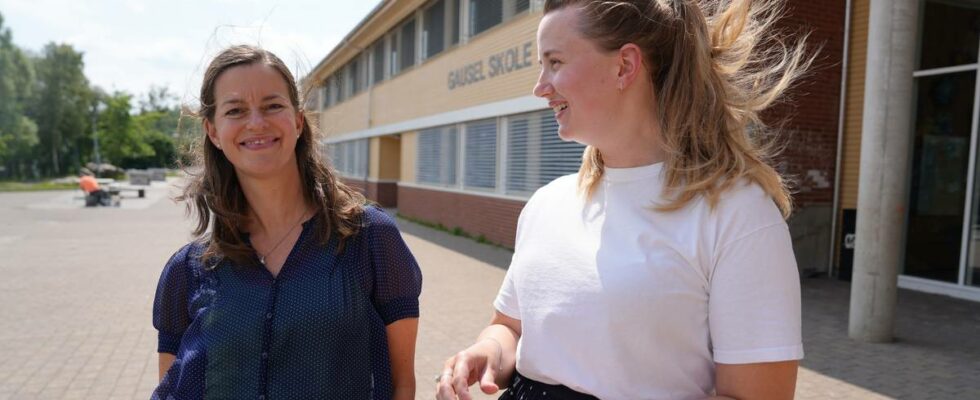– We are concerned that some children become very passive and big. If you are big as a child, it follows into adulthood for many, says public health nurse Kristine Eikrem at Gausel School in Stavanger. A new, comprehensive study of 78,000 children in Bergen (external link) from 2010 to 2022 shows that obesity and overweight increased in 4-, 6- and 8-year-old boys during the pandemic. For the girls, there was no particular change. – Basically, young boys are much more active than girls. One might think that younger boys were more vulnerable when society shut down, says pediatrician and PhD student Melissa Balthasar at Stavanger University Hospital. She is part of the research group at the University of Bergen and the Institute of Public Health, which is behind the investigation. Melissa Balthasar works on a daily basis at the children’s and youth clinic at Stavanger University Hospital. She has been involved in the research project. Photo: Anett Johansen Espeland / news – Among the eight-year-old boys, the proportion who were overweight and obese was between 11 and 14 per cent in the period before the pandemic. Then the number increased to between 16 and 17 per cent in the corona years, says Balthasar. Nevertheless, she views the report positively. – Obesity among boys decreased before the pandemic, so it was a positive trend. At the same time, it was stable among girls both before and during the pandemic. Norway generally comes out better than many other countries, says Balthasar. Want smaller screens in school – I am concerned that we are now seeing that more are getting bigger. We have a job to do, says public health nurse Tonje Fredriksen at Gausel school. She is concerned that overweight children have poorer mental health, less well-being and a social stigma. Then there are physical problems as well. The health nurses at Gausel have asked how colleagues in Stavanger view the survey from Bergen. Health nurses Kristine Eikrem and Tonje Fredriksen want more physical activity in school. Photo: Anett Johansen Espeland / news – Many say they think that the boys are happy to play games if they get the chance. Parents worked at home, and to keep these boys calm, it was easy to give access to more screens, says Eikrem. The health nurses believe that society must learn from this study. They think there is too much use of screens in school too. Today, for example, it is common to watch a film during the lunch break. – We are really fans of more physical activity in school and more arrangements for the brain to have a break from sitting still. Being able to move the body will actually increase both learning and well-being and mastery, says Fredriksen. Child register on the way What is unique about the study from Bergen is that it uses data from almost all the children in a large area, and not just a sample. About 95 per cent of the children in Bergen are included in the survey. Pétur Benedikt Juliusson, FHI. Photo: Folkehelseinstituttet / FHI The Folkehelseinstituttet (FHI) is now working to get a national child register in place. Data from the routine measurements of all children in Norway will be collected there. The routine checks at health centers and in the school health service are carried out when the children are 2, 4, 6, 8 and 13 years old. – The study from Bergen can be seen as a first step towards a “child register”. It has taken a long time, but the goal is for this to be in place in the near future, says pediatrician and senior researcher at FHI, Pétur Benedikt Juliusson. – A lot of information is recorded today, but it has been poorly structured, and therefore difficult to use to say anything about the children’s health or development. That is what we want to do something about, he continues. Parents have a lot of responsibility A recent survey shows that few third graders mind being weighed. – Parents are happy that we measure and follow up. Some say that they get a “boost” to take action at home when they have spoken to us and received the results, says health nurse Eikrem. – Can there be too much focus on weight at a vulnerable age? – We are concerned that you are more than your weight. We work just as much with self-image and emotions, as if they should gain more weight. They believe that parents have a great responsibility. – We know that the earlier we can detect weight problems, the easier it is to turn them around. And the younger the child, the more responsibility is placed on the parents. When the child gets older, they themselves have to get more involved, says Fredriksen. Jan Ole Sæterdal with his daughter Ingrid. Photo: Anett Johansen Espeland / news Jan Ole Sæterdal is the father of two young girls. So far, he has not been worried about the children having any problems with weight. – It is natural to have these weight measurements. It is good for us parents to get guidance. And then it’s good to be open about this with weight too, as it is with most things in life. Published 09/07/2024, at 12.59
ttn-69
After several years of decline, obesity and overweight increased in boys during the pandemic – news Rogaland – Local news, TV and radio

